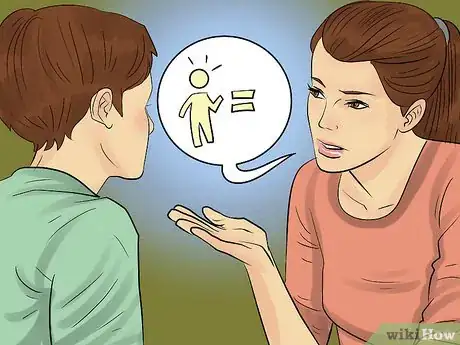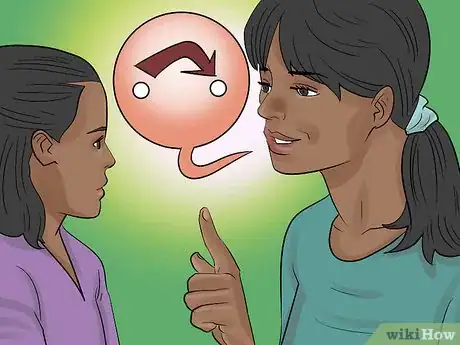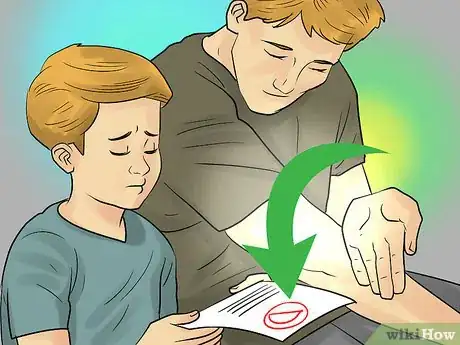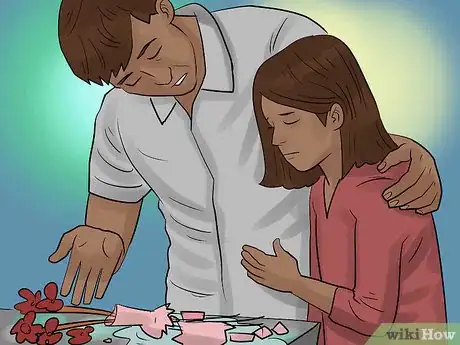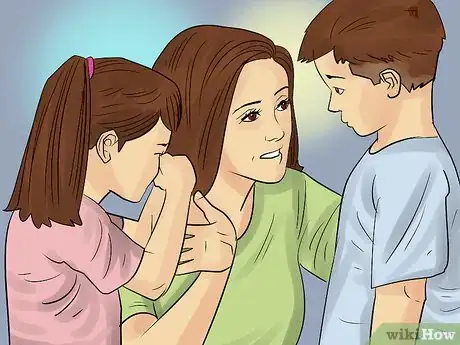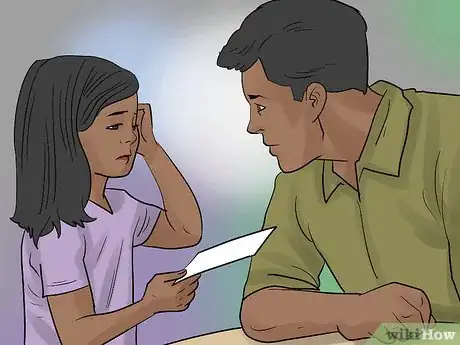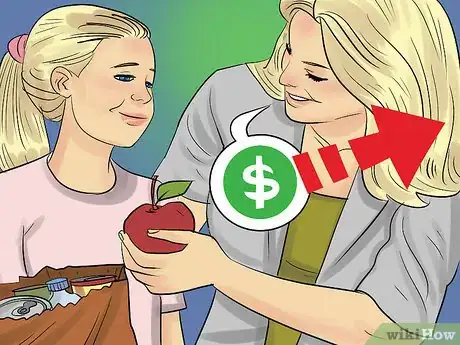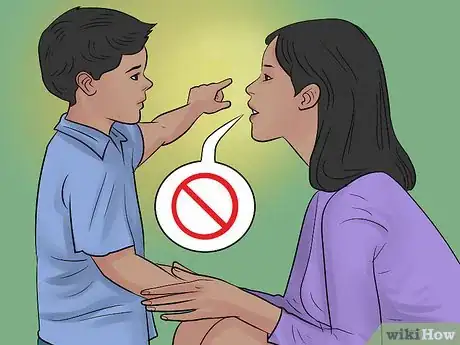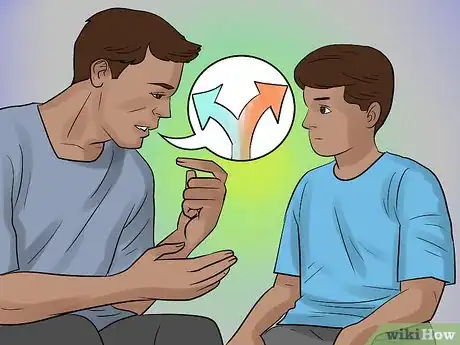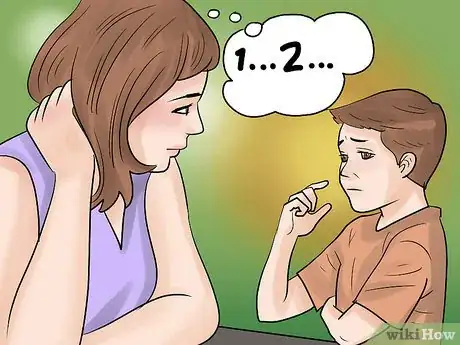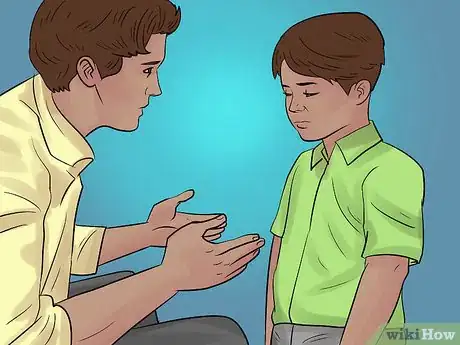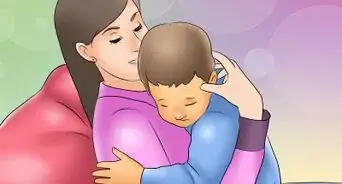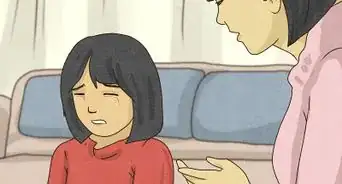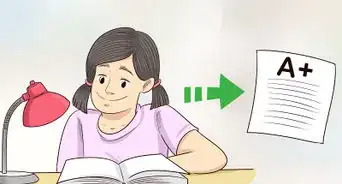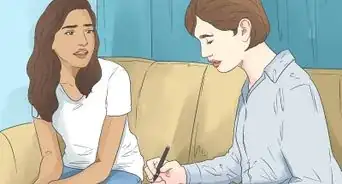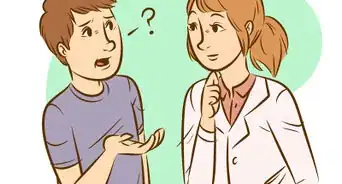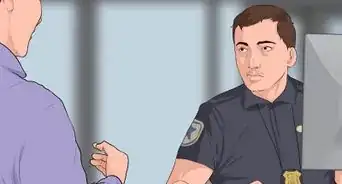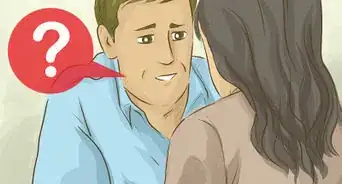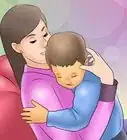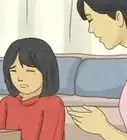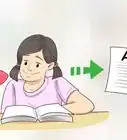This article was co-authored by Jade Giffin, MA, LCAT, ATR-BC. Jade Giffin is an Art Psychotherapist based in New York, New York. She brings over a decade of experience specializing in the treatment of trauma and grief, pre and post-partum and parenting challenges, anxiety and stress management, self-care, and social, emotional, and learning difficulties for adults, teenagers, and children. Jade holds a BA in Psychology and Visual Arts from Barnard College and an MA in Art Therapy from New York University with distinction. She is a Hughes Fellow and Lehman Award recipient for providing outstanding clinical work. Jade's roles also encompass clinical supervisor, therapeutic program developer, published researcher, and presenter.
This article has been viewed 25,715 times.
Kids have a natural tendency to want to avoid taking responsibility for the actions they've taken. No one likes to get in trouble, particularly kids. However, you can teach your child to honor things they've done. The first step is to help them understand that all actions have effects, with a wide range from pleasant to unpleasant. Next, you need to help your children learn how to be accountable for what they've done. The best way to do this is to set a good example by modeling accountability and managing your response to their truth-telling.
Steps
Helping Children Understand the Effects of Their Actions
-
1Explain natural consequences. As you go through your day with your child, make sure to talk about the ways that actions lead to certain results. This advice is not about punishment. Rather, it's about neutrally discussing the ways that what a person does affects the eventual result (both favorable and unfavorable).[1]
- For example, if your child brings home a good grade, you could say, "See, you got a good grade on this because you worked so hard."
- Your discussions don't have to center only on your child. You can discuss situations with yourself, too. For example, you could say, "I was late to work today, so my boss was mad."
- You may have to explain how some consequences occur quickly and others occur further down the line. This will help to get them thinking about the future.
- It's also helpful to validate that sometimes your child might intend to achieve a certain result, but they might not always get the result they hope for—like they might study for a test but still not get the grade they wanted or possibly deserved.[2]
-
2Encourage action and consequence role play. Another way to help your child think about how actions have natural consequences is to set up verbal scenarios for them. You propose an action or situation and ask your child what they think would happen next.[3] When something happens and your child has to make a decision, this is a good time to have them talk through the possible options and results.
- For instance, you could say, "Say you forgot to tell me you had a club meeting after school. What would happen?" Don't judge what they say. The point is to help them think through how an action has an effect.
Advertisement -
3Let natural consequences take their course. Natural consequences help children realize how their actions can affect themselves and people around them. Sometimes, you may be tempted to let children off the hook, but instead, let them experience consequences (within limits, of course).
- For instance, if your child resist cleaning up their toys, you may want to avoid conflict and do it for them. Consider providing a time when you don't clean up the toys and they remain messy. The consequence may be that your child can't find the toy they want to play with.[4]
Teaching Accountability
-
1Use logical consequences when natural ones don't make sense. Sometimes, a natural consequence will be too delayed to have an effect on behavior (such as cavities developing when teeth aren't brushed). Other times, safety is a concern (such as when a child wants to run into the street). In these cases, and others, natural consequences aren't a good solution. Logical consequences are ones you impose, but they fit the situation rather than seem arbitrary.
- For instance, if your child breaks something, have them pay for it out of their allowance or do extra chores to pay it off. That is a more logical consequence than being grounded.
- When you impose a logical consequence on your child, make sure to talk to them about why you're doing it. Otherwise, they might just get upset and not understand.
-
2Avoid forced apologies. When your child does something to another person, such as making a sibling cry, your instinct may be to tell the child to apologize. However, forcing a child to apologize doesn't help them learn how to accept responsibility in the future. It just temporarily "fixes" the current situation and possibly fosters resentment. It's more impactful to help your child come to the conclusion that they will need to repair the relationship.[5]
- Using the example, forcing the child to say "I'm sorry" won't mean much to either the child or their sibling. However, if you talk with the child about why they made their sibling cry, helping them deal with the emotions and adaptive methods for expressing them, it will help them de-escalate. Be sure to use the situation as an opportunity to teach more appropriate coping skills and to encourage empathy by asking you child to remember how they felt when someone made them cry.
- Pretty soon, they will realize that their sibling is mad at them, and they need to do something to repair what they've done to their relationship with their sibling. That shows them their actions have consequences that they need to do something about. You can prompt them by saying something like, "What do you think you can do to help your sibling feel better?"
- They might apologize, or they might do something else to make up for it. Either way, letting the child initiate it will help it feel better, and they'll be more likely to do something similar in the future on their own.
-
3Assist with problems rather than fixing them. If your child finds themselves in a hard situation (that they got themselves into), you may be tempted to swoop in and fix it for them. However, a recommended approach is letting the child try to fix it themselves, with support from you as needed.[6]
- For example, say your child comes home with a bad grade. You may be tempted to lay out a plan for how your child can improve. Instead, ask the child, "I see you are having some trouble here. Do you have ideas of ways you can support achieving your goals in this class?"
- If your child needs it, you could offer, "Is there something I can do to help?" You might also say something like, "This is important. Let's both take time to think about how I can help support you, then we'll trade notes." This might include helping them write out a plan they can stick to—it will resonate more if they have a part in designing the plan
- Once you come up with a support plan, teach them to revisit the plan regularly to see how it’s working, assess it, and make changes as needed.
-
4Model responsible behavior. When you make a responsible choice, sportscast or narrate it as you do it. That way, your child will be able to see the methods you use to get our desired outcomes. (If you don't get the outcome you wanted, acknowledge that, too.) Children benefit from positive examples of behavior to help them learn responsibility.[7]
- For example, you could say, "I won't go over the speed limit because that's unsafe and I could cause an accident." Alternatively, you could try, "Let's return to the store and pay for this apple because the cashier overlooked it. We don't take things that aren't ours."
-
5Make appropriate responses to blame avoidance. If your child does something against the rules, they may try to blame it on someone else, such as "Sister made me do it!" A typical response to this excuse is, "If Sister jumped off a bridge, would you jump off a bridge?" The problem with this response is that it isn't clear enough about what the problem is. Your child needs a direct and concrete explanation conveyed calmly and without shame.[8]
- Instead, say something like, "Your sister may have influenced you, but you decided to do it yourself. You could have chosen not to follow your sister, but you didn't. Therefore, you're responsible for what you did."
- Be sure to point out times along the way that they could have made a different choice to encourage them to learn how to get out of these situations earlier.
Checking Your Own Behavior
-
1Own up to your own actions. Children learn by seeing behaviors modeled (and explained). Therefore, you must model owning up to your actions to your child, as they'll be watching you to see how they should behave. If you do something wrong, admit it and apologize—that will show that even when you're an adult, you can take responsibility for your actions.[9]
- For example, say you were late picking up your child from school. Instead of saying, "I was late because there was so much traffic," you could say, "I'm sorry I'm late. It's frustrating to have to wait for me at pick-up. I didn't leave enough time, but I will tomorrow."
- Similarly, don't make children take responsibility for the consequences you impose on them. Instead of saying, "Because you didn't come home on time, I guess that means you want to stay home this weekend," say, "By coming home after curfew, you are showing you are not able to keep it responsibly and could benefit from practice doing so."
-
2Stay calm when your child owns up to something. If your child is honest with you about something you did and you blow up, they're not likely to be honest the next time. It's important to stay calm, even if you're upset about what they did. If you feel yourself getting upset, try considering why it's a trigger for you and giving yourself space to process accordingly. In more time-sensitive moments, count to 10, or take a few, deep calming breaths before responding.[10]
- If you need to, take a short break before discussing the issue with your child. Wait until you can have a calm conversation.
- Also, make sure to give your kid kudos for being honest with you.
-
3Enforce the rules. Your kid relies on you to set boundaries with them, which includes enforcing the rules. You can't expect your child to accept responsibility for your actions if you continually make exceptions for them. Holding them to the rules helps them realize that they must own up to things they've done.[11]
- For example, if you want your child to learn to take care of their things, teach them from an early age to make their bed each day, put their toys away, and so on.[12]
- Although it is not always possible, it is ideal if the rules exist before a situation occurs and that your child has a good understanding of the rules. Do your best to avoid looking like you are making up the rules as you go.
Expert Q&A
Did you know you can get expert answers for this article?
Unlock expert answers by supporting wikiHow
-
QuestionHow can I help my child take more responsibility?
 Jade Giffin, MA, LCAT, ATR-BCJade Giffin is an Art Psychotherapist based in New York, New York. She brings over a decade of experience specializing in the treatment of trauma and grief, pre and post-partum and parenting challenges, anxiety and stress management, self-care, and social, emotional, and learning difficulties for adults, teenagers, and children. Jade holds a BA in Psychology and Visual Arts from Barnard College and an MA in Art Therapy from New York University with distinction. She is a Hughes Fellow and Lehman Award recipient for providing outstanding clinical work. Jade's roles also encompass clinical supervisor, therapeutic program developer, published researcher, and presenter.
Jade Giffin, MA, LCAT, ATR-BCJade Giffin is an Art Psychotherapist based in New York, New York. She brings over a decade of experience specializing in the treatment of trauma and grief, pre and post-partum and parenting challenges, anxiety and stress management, self-care, and social, emotional, and learning difficulties for adults, teenagers, and children. Jade holds a BA in Psychology and Visual Arts from Barnard College and an MA in Art Therapy from New York University with distinction. She is a Hughes Fellow and Lehman Award recipient for providing outstanding clinical work. Jade's roles also encompass clinical supervisor, therapeutic program developer, published researcher, and presenter.
Art Psychotherapist
References
- ↑ http://www.parents.com/kids/responsibility/values/its-not-my-fault/
- ↑ Jade Giffin, MA, LCAT, ATR-BC. Art Psychotherapist. Expert Interview. 30 October 2020.
- ↑ http://www.parents.com/kids/responsibility/values/its-not-my-fault/
- ↑ Jade Giffin, MA, LCAT, ATR-BC. Art Psychotherapist. Expert Interview. 30 October 2020.
- ↑ http://www.ahaparenting.com/parenting-tools/character/responsibility
- ↑ http://www.ahaparenting.com/parenting-tools/character/responsibility
- ↑ Jade Giffin, MA, LCAT, ATR-BC. Art Psychotherapist. Expert Interview. 30 October 2020.
- ↑ https://www.schoolfamily.com/blog/2011/06/06/teaching-children-to-accept-responsibility-for-their-actions
- ↑ Jade Giffin, MA, LCAT, ATR-BC. Art Psychotherapist. Expert Interview. 30 October 2020.
- ↑ http://www.parents.com/kids/responsibility/values/its-not-my-fault/
- ↑ http://www.parents.com/kids/responsibility/values/its-not-my-fault/
- ↑ Jade Giffin, MA, LCAT, ATR-BC. Art Psychotherapist. Expert Interview. 30 October 2020.
